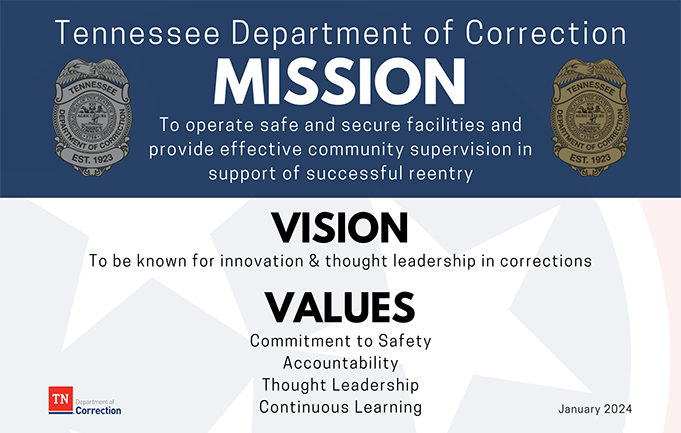Department Overview

The Tennessee Department of Correction (TDOC) works towards becoming the best correctional agency in the nation. Its mission is to operate safe and secure facilities and provide effective community supervision to support successful reentry. TDOC aims to be known for its innovation and thought leadership in the field of corrections, and is guided by the values of safety, accountability, and continuous learning.
TDOC is responsible for 14 adult prisons across the state, housing approximately 20,000 inmates. Ten of these facilities are operated by TDOC, while four are managed through a private contractor. In addition to the prisons, TDOC oversees 46 probation parole offices across 13 judicial districts, supervising 75,000 adult offenders in the community. The department also operates eight Day Reporting and Community Resource Centers, which serve as alternatives to incarceration.
TDOC is fully accredited by the American Correctional Association and employs nearly 6,000 correctional professionals. Through TDOC’s Tennessee Correction Academy, staff and officers receive pre-service, in-service, and specialized training, and have access to a variety of professional development opportunities.
Research shows 95% of Tennessee’s incarcerated population will one day be released from prison, therefore, TDOC remains focused on reducing recidivism through effective, evidence-based programs, community partnerships, and reentry services. While in custody, offenders have access to a variety of educational and vocational opportunities, as well as comprehensive medical and behavioral health services. Upon release, TDOC provides offenders with essential documents such as state identification and birth certificates, and with the help of community partnerships, can assist with other reentry services such as housing, employment, benefits, and education.
TDOC works to ensure seamless supervision of every individual, whether a person is on probation, parole, or under the supervision of a community corrections program. TDOC holds offenders accountable, improves offender outcomes, and reduces recidivism through effective community supervision. Community supervision has also implemented several legislative and best practice initiatives including graduated sanctions, incentives, and mandatory supervision.
As part of the Public Safety Act of 2016, TDOC implemented Day Reporting/Community Resource Centers which places offenders with moderate to high substance use in a structured, intensive outpatient program. The program provides participants with evidenced-based programming and treatment while they can continue to be with their families and work towards becoming productive citizens in their communities.
TDOC is committed to supporting victims, their families, and the laws that protect their rights. Through the Division of Victim Services, the department provides direct, timely, and quality information as mandated by law to registered victims, survivors, family members, and interested parties of an offender’s status, release date, escapes, and movement from one facility to another. To increase awareness of the impact of crime on victims, TDOC provides victim impact classes to offenders at all facilities and community supervision districts, designed to increase accountability and responsibility to reduce recidivism.
The department continues to implement new technology to enhance the safety and security of facilities, provide additional resources and upgraded safety equipment to officers, and address the barriers to successful reentry. The men and women who work for the Tennessee Department of Correction are dedicated public servants who take great pride in their responsibilities, and together, strengthen public safety in the communities of our great state.